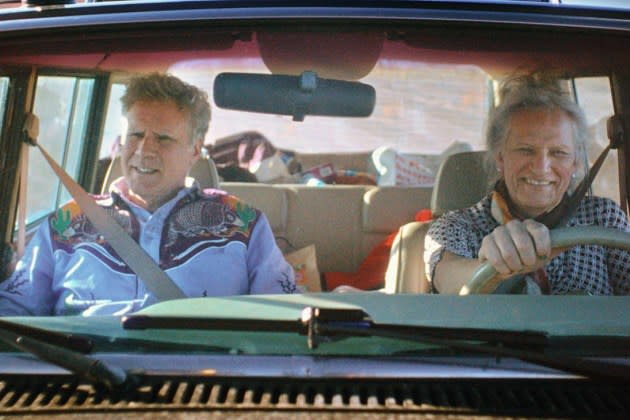‘Will & Harper’ Review: Will Ferrell and Harper Steele Charm Their Way Through an Endearing Road Trip Doc

When former SNL writer Harper Steele came out as trans, she told her friends and family via email. “I’m old now,” the letter said, “I’ll be transitioning to live as a woman.” In addition to announcing her plans, she also shared some of her anxieties about the process. Her fear was not about transitioning, but that she might lose some people that she loved.
Steele and her close friend Will Ferrell read the email at the top of their endearing documentary, Will & Harper. The film, directed by Josh Greenbaum (Barb & Star Go to Vista Del Mar) chronicles a 16-day road trip the two friends take across America to process Steele’s transition, reflect on their friendship and consider what it means to be trans in America. On that last subject, the doc is well-meaning but shaky; traveling through some of the most hostile towns in the country would be far more difficult without the shield of celebrity. Still, Will & Harper charms as a portrayal of deep, sustaining and supportive friendship.
More from The Hollywood Reporter
It can be easy to scoff at the after-school-special-seeming premise of Will & Harper, but at a time when trans people are under threat, the documentary might have a chance of reaching otherwise unengaged populations. Just this week, Republican Ohio Governor Mike DeWine announced proposals that could restrict gender-affirming care for adults in the state. Dozens of other states have bans on gender-affirming care for children in place.
Before they set out on the road, Ferrell and Steele discuss this bleak and dangerous climate for trans people. The documentary opens with their separate interviews, in which they express their expectations and anxieties about the trip. They also talk about what kinds of questions they have for each other. Ferrell worries about blundering or offending; Steele wonders if she and Ferrell will remain friends.
The two met on their first day working at Saturday Night Live in 1995. An immediate friendship was born as Ferrell and Steele discovered their humor aligned, and over the next 30 years they deepened their professional and personal relationship. After Ferrell read Steele’s email, he proposed the road trip as a way to not only understand this new phase of Steele’s life but also to help his friend feel like she could maintain her interests. Early in the doc, the two joke about how Steele, who was born in Iowa City, Iowa, enjoys terrible beer, the diviest dive bars and anything All-American. What would it mean for her to return to her favorite places across the country knowing the current climate for trans people?
The journey yields some surprising revelations as well as predictable responses from people they encounter. Ferrell and Steele start in New York, where they have breakfast with Steele’s kids, and visit their old stomping ground at 30 Rock. After lunch with friends — Tina Fey and Seth Meyers, among others — they head to their first stop: Washington, D.C.
From over 200 hours of material, Greenbaum shapes a straightforward documentary that moves nimbly. Zoë White’s unfussy cinematography largely keeps attention on the duo, save for the occasional wide shot of the American countryside. Ferrell and Steele’s conversations range from innocuous curiosities to weightier inquiries. Steele talks about when she knew she was a woman and reads from her old journals, some of which are excerpted and displayed. Through these old entries, one can hear the pain of repression and the sadness of self-loathing.
As Ferrell and Steele journey deeper into the heartland of America, the texture of their conversations changes along with the threat levels. Confederate flags make cameos and the intensity of the stares fluctuates. Although Will & Harper portrays the experience of one trans woman, one can’t help but think about the extra layer of violence these places would present to a person of color.
At a Pacers game in Indiana, Ferrell and Steele encounter Republican governor Eric Holcomb, who recently signed a gender-affirming care ban in the state. Later, Steele expresses how uncomfortable the interaction between the governor and Ferrell made her feel. An apologetic Ferrell also reflects on his behavior, and admits to his ignorance of the governor and his policies. There are other moments like these in Will & Harper when the pair engage in vulnerable and uncomfortable discussions about boundaries being crossed or safety being compromised. This level of honesty keeps the conversations grounded and helps the documentary avoid turning Steele into a prop for Ferrell’s education.
Will & Harper works because, at its core, the doc is a tribute to Ferrell and Steele’s evolving friendship. Two weeks on the road help the pair become reacquainted with one another, and their intimacy can be measured by the kinds of jokes they exchange. Early in the film, Ferrell’s humor reads as a coping mechanism, a reflex to lighten too-serious situations. But by the time they reach Vegas — after a vitriolic experience in Texas — Ferrell and Steele have created a shared language based on these new experiences. Their jokes are sharpened by the renewed ease that has settled into their conversations.
What they talk about changes, too, as Steeles goes from explaining her transition to sharing her hopes, fears and insecurities about living as a woman. Ferrell still asks questions, but he opens up about his own anxieties. This recalibrates the relationship, creating a space where both Ferrell and Steele can be emotional with one another. When the journey in Will & Harper comes to the end, it feels like a new beginning.
Best of The Hollywood Reporter

